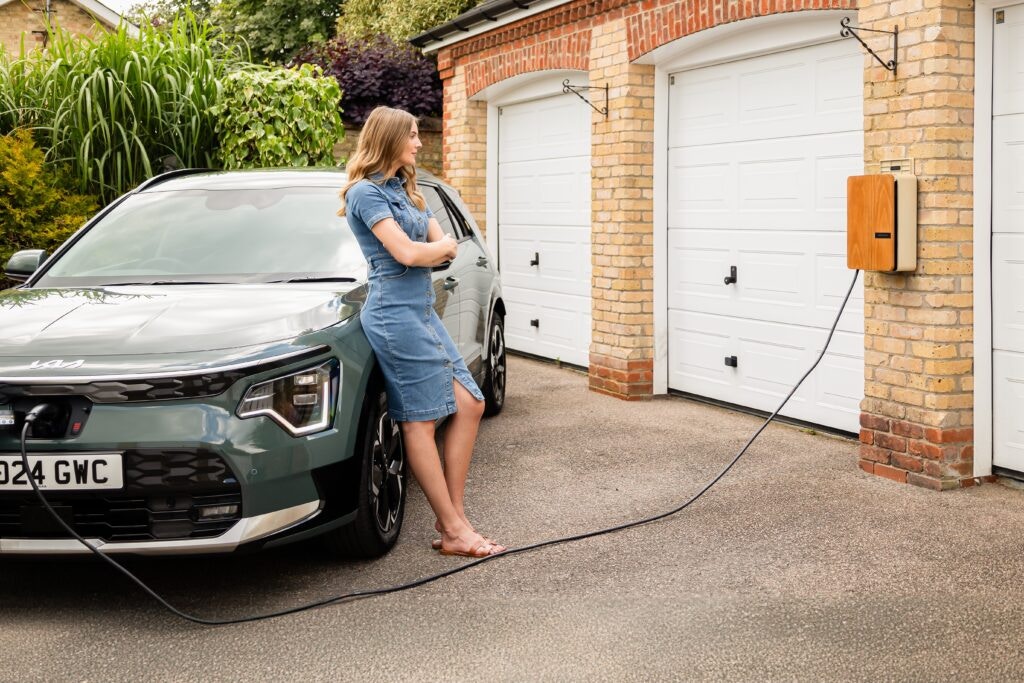How safe are electric cars?

We see more and more electric cars on our roads and hear horror stories of them randomly setting fire. It does beg the question… are they truly safe?
The answer is studies have shown that modern electric vehicles (EVs) are less likely to catch fire than traditional petrol and diesel cars. They also have advanced safety features, such as robust battery protection, cutting-edge crash prevention systems, and enhanced fire resistance.
But, they bring their risks, like high-voltage batteries and potential other fire hazards. Read on to find out more.
- The truth about electric car fires
- Safety concerns with EV charging
- Electric cars and pedestrian safety
- FAQs

The truth about electric car fires

Comparing EV fires with petrol/diesel car fires
Electric vehicle fires are less frequent than those in petrol or diesel cars. Studies show that internal combustion engine (ICE) vehicles experience significantly more fires due to fuel leaks and engine malfunctions.
EV fires can be more challenging to extinguish due to high-voltage batteries. But, the overall fire risk in EVs is lower, making them safer than traditional vehicles.
Understanding battery technology and safety mechanisms
EV batteries, primarily lithium-ion, are designed with multiple safety mechanisms to prevent overheating and fire. These include:
🧯Thermal management systems
🔋 Battery management software
🥊 Robust casing to protect against physical damage
Plus, manufacturers incorporate automatic shut-off features to disconnect the battery during a crash.
Continuous advancements in battery technology focus on enhancing safety, reducing fire risk, and ensuring reliable performance under various conditions.
Safety concerns with EV charging

Home charging safety protocols
Home charging for EVs is safe when following proper protocols. Installing a dedicated EV charger, rather than relying on standard sockets, ensures optimal performance and safety.
Chargers must meet safety standards, including:
👍 Overload protection
👍 Proper grounding
👍 Regular inspections
👍 Following manufacturer guidelines
By strictly sticking to these protocols, you can mitigate risks such as electrical faults and ensure safe, efficient charging at home.
Dispelling the myths about charging in adverse weather conditions
Charging an electric vehicle in adverse weather, such as rain or snow, is safe, thanks to robust design standards. EV chargers and connectors are waterproof and weather-resistant, preventing water ingress that could cause short circuits.
Myths about electric shocks or fires in wet conditions are unfounded. The vehicle and charging equipment are rigorously tested for safety, and proper charging equipment operation helps ensure safety regardless of the weather.
The impact of fast charging on battery health and safety
Fast charging, while convenient, can have long-term effects on battery health if used excessively. High charging speeds generate more heat, which, over time, can lead to thermal stress and reduced battery lifespan.
However, modern EVs have thermal management systems to mitigate these effects and maintain safety. For optimal battery longevity, it’s advisable to use fast charging sparingly and rely on regular charging for day-to-day needs.
Electric cars and pedestrian safety
Innovations in sound generation for EVs to alert pedestrians
Electric vehicles are naturally quieter than traditional cars, raising concerns about pedestrian safety, especially when people cross the road. To address this, governments worldwide have introduced legislation requiring electric vehicles to emit artificial sounds at low speeds to protect pedestrians.
In the UK, for instance, EVs must produce noise when travelling under 12mph.
This has led manufacturers to develop innovative sound generation systems that emit artificial noises at low speeds. These sounds are designed to be audible without being intrusive. They mimic engine noise or can be unique alerts.
These innovations help ensure that pedestrians, especially those with visual impairments, can detect approaching EVs, making our roads safer in urban settings.
FAQs
Is an electric car safe in a crash?
Yes, electric cars are safe in crashes. They undergo rigorous testing and have advanced safety features like reinforced battery compartments and multiple airbags. Additionally, their low centre of gravity reduces rollover risks, enhancing overall crash safety.
What are the risks of electric cars?
The main risks of electric cars include:
⚠️ Potential battery fires
⚠️ High-voltage hazards
⚠️ Fast charging issues that affect battery health
However, advanced safety technologies, robust design, and ongoing improvements in EV manufacturing counter these risks.

Is it time to sell your car?
Ready to learn more about valuing, maintaining, and selling your car? Check out our other guides here, covering everything from hybrid and electric car depreciation to converting your vehicle to dual-LPG fuel.
- Sell my car
- Track your car value
- Electric cars – the ultimate guide
- How to sell an electric car
- What is a hybrid car and how do they work?
- How long does it take to charge an electric car?
- What is a mild hybrid car?
- Which car companies make electric cars?
- Why don’t solar panels power electric cars?
- Why do electric cars have a green stripe on the number plate?
The information provided on this page is for general informational purposes only and should not be considered as professional advice.